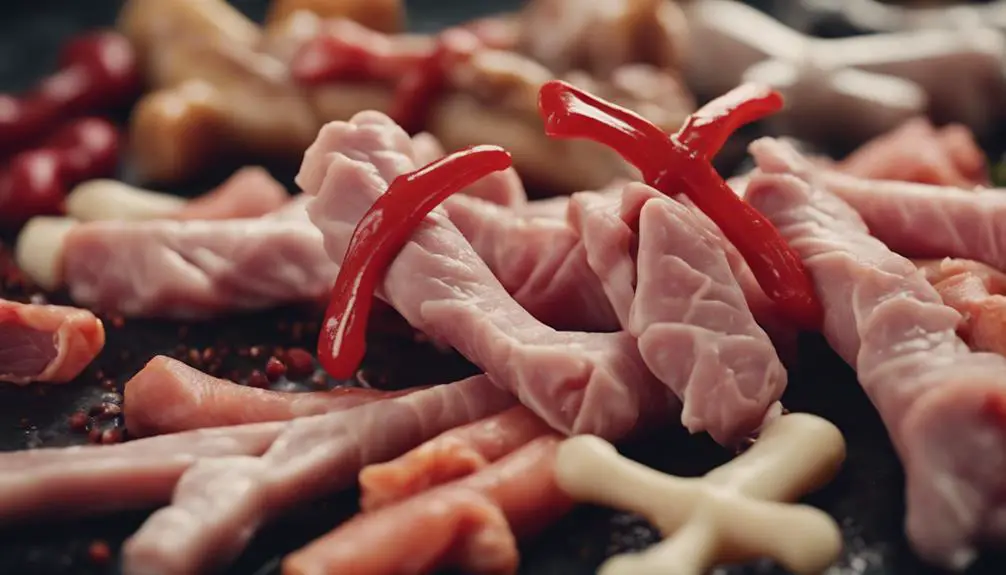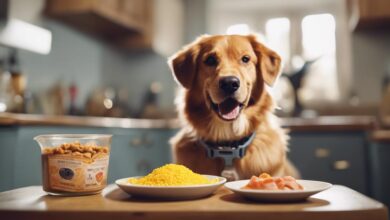What Raw Meat Can Dogs Not Eat
You shouldn't feed your dog raw chicken bones due to choking and digestive risks. Pork raw meat should be lean, bone-free, and fully cooked without seasonings. Raw fish may contain harmful bacteria, parasites, and mercury. Wild game carries contamination and parasite risks, so consult a vet and use reputable suppliers. Processed meats can harm dog health with preservatives and additives. Spoiled meat can lead to illnesses, so watch out for signs and feed fresh meat. Learning about safe meat preparation methods and plant-based options can help guarantee your dog's health and well-being.
Key Takeaways
- Avoid feeding dogs chicken bones due to choking and splinter risks.
- Cook pork thoroughly, remove bones, and limit fat intake for dogs.
- Raw fish can contain harmful bacteria, parasites, and toxins for dogs.
- Be cautious with wild game due to bacterial contamination and parasites.
- Processed meats can have harmful effects on dogs' health due to preservatives and additives.
Chicken Bones
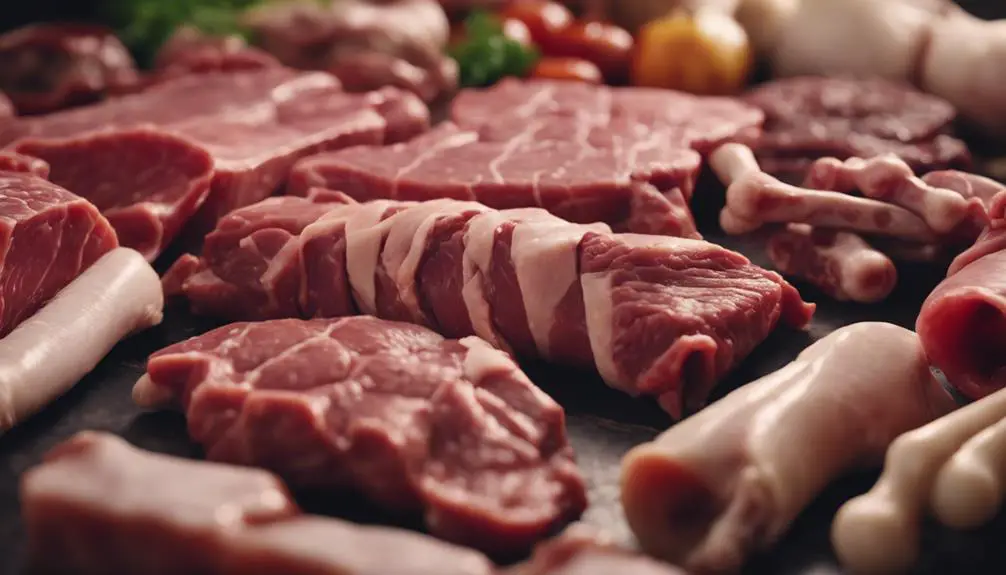
Chicken bones pose a significant danger to dogs when consumed, potentially causing choking hazards, splinter risks, internal injuries, or digestive blockages. The bone hazards associated with chicken bones are due to their brittle nature, which can easily splinter, leading to sharp fragments that may injure the dog's mouth, throat, or digestive tract. When swallowed, these splinters can puncture the stomach or intestines, causing serious complications. Additionally, the size and shape of chicken bones make them prone to getting lodged in the throat, leading to choking incidents. To safeguard your furry friend from such digestive issues, it is important to never feed them chicken bones, whether cooked or raw, as the risks far outweigh any potential benefits.
Pork Raw Meat
When contemplating your dog's diet, it is crucial to comprehend the potential risks associated with feeding them raw pork meat. While pork can be a tasty treat for your furry friend, there are important factors to take into account regarding pork safety and handling precautions.
| Pork Safety | Cooking Tips | Precautions |
|---|---|---|
| Choose lean cuts | Cook thoroughly | Avoid seasonings |
| Remove bones | Avoid added salt | Store properly |
| Limit fat intake | Monitor cooking time | Wash hands after handling |
Raw pork can contain harmful bacteria like Salmonella or Trichinella, putting your dog at risk. To make certain of safe consumption, always cook pork thoroughly, remove bones that may splinter, and avoid seasonings like garlic or onion. Additionally, practice good hygiene by washing hands after handling raw meat. Stay vigilant to keep your furry friend healthy and happy.
Raw Fish
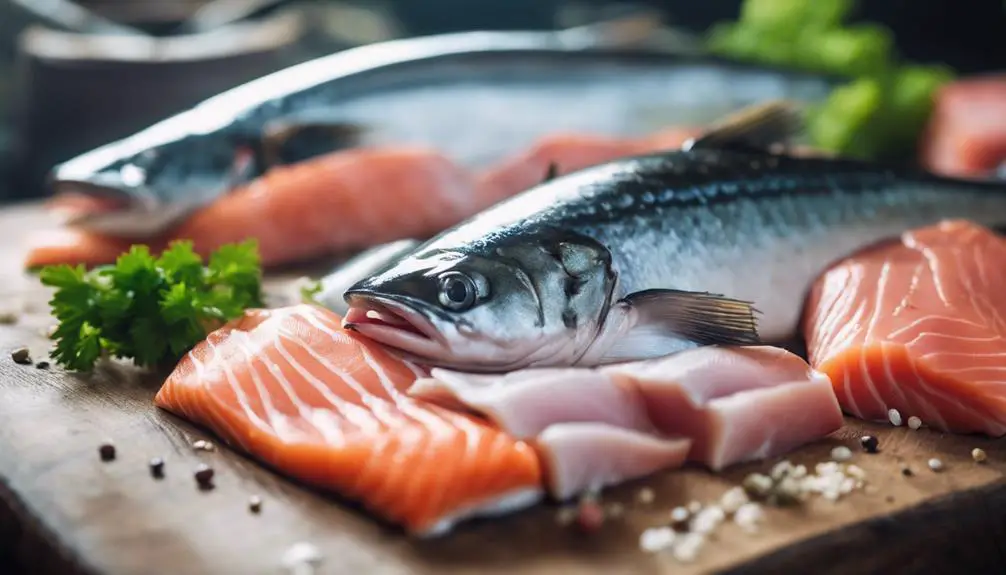
When feeding your dog raw fish, it's important to be aware of the potential risks it poses. Raw fish can contain harmful bacteria, parasites, and toxins that may be detrimental to your pet's health. Additionally, consuming raw fish regularly can lead to nutrient deficiencies, affecting your dog's overall well-being.
Toxicity of Raw Fish
Raw fish poses a significant risk of toxicity for dogs and should be avoided in their diet to prevent potential health issues. Mercury levels in certain fish species can accumulate over time, leading to mercury poisoning in dogs if consumed regularly. Additionally, raw fish is prone to bacterial contamination, such as Salmonella and Listeria, which can cause gastrointestinal problems and even more severe infections in dogs. These bacteria are not always eliminated through freezing or other common food preparation methods, increasing the risk of illness for your pet. To ensure your dog's well-being, it is best to exclude raw fish from their diet altogether and opt for safer protein sources like cooked meats or specially formulated dog food.
Parasite Risks
Consuming raw fish can expose dogs to a variety of harmful parasites, posing a significant health risk to their well-being. To prevent parasite infestations, consider cooking fish thoroughly before feeding it to your dog. Properly cooked fish eliminates the risk of parasites, ensuring your dog's safety. Additionally, incorporating dietary supplements that support your dog's immune system can help combat potential parasitic infections. When planning your dog's feeding schedule, avoid feeding raw fish frequently to minimize the risk of parasite exposure. By being mindful of cooking methods, supplementing their diet, and managing their feeding schedule, you can effectively reduce the chances of parasite-related health issues in your furry companion.
Nutrient Deficiencies
To guarantee your dog receives essential nutrients for peak health, it's important to understand the potential nutrient deficiencies that can arise from feeding them raw fish. When incorporating raw fish into your dog's diet, you must be cautious of the following:
- Imbalance in Omega-3 and Omega-6 Fatty Acids: Raw fish may contain an imbalance of these essential fatty acids, leading to health issues.
- Thiamine Deficiency: Raw fish contains thiaminase, an enzyme that breaks down thiamine, causing a deficiency in this important nutrient.
- Vitamin B Deficiency: Raw fish can lack essential B vitamins important for your dog's overall health.
- Mineral Imbalance: Consuming raw fish exclusively may result in an imbalance of minerals necessary for a balanced diet and proper nutrition.
Wild Game
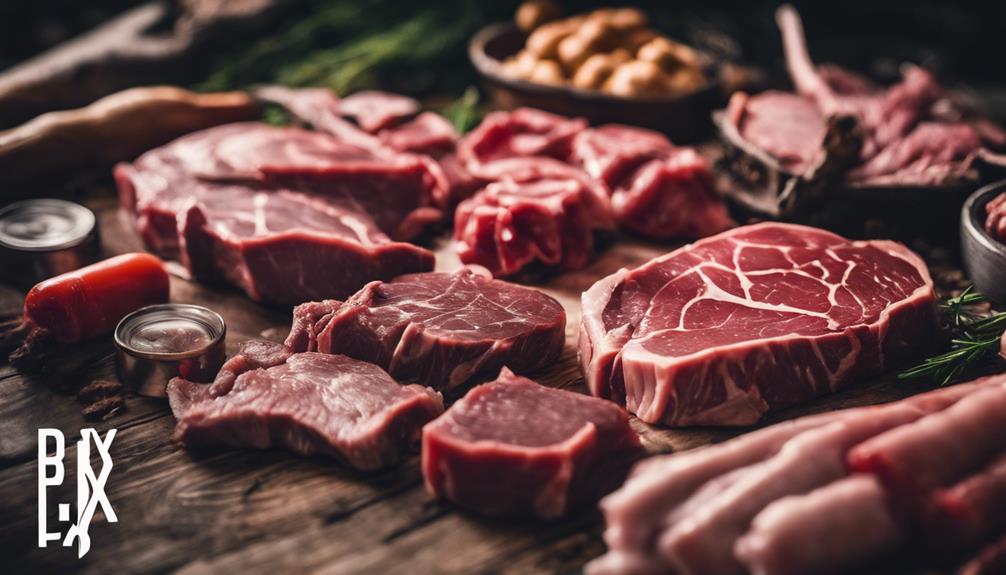
When considering the diet of your canine companion, it is important to be cautious about incorporating wild game into their meals. Game meat precautions should be taken to guarantee your dog's safety and health. Wild game safety measures include avoiding feeding your dog raw wild game due to potential risks of bacterial contamination like Salmonella or E. coli. Additionally, wild game may contain parasites that can harm your pet if not properly cooked. It is vital to source wild game from reputable suppliers to minimize the risk of contamination and make sure that the meat is handled and stored correctly. Always consult with your veterinarian before introducing wild game into your dog's diet to prevent any potential health issues.
Processed Meats
When it comes to processed meats, you should take into account the harmful effects they can have on your dog's health. These meats often contain additives and preservatives that can pose serious health risks to your furry friend. To guarantee your dog's well-being, consider exploring safe meat alternatives that are free from harmful processing.
Harmful Processed Meat
Consuming processed meats poses serious health risks due to the high levels of preservatives and additives added during the processing. When it comes to processed meats, it's important to take into account the following:
- Meat Quality: Processed meats often contain low-quality cuts mixed with additives, making them less nutritious compared to fresh meats.
- Cooking Methods: Processed meats are usually high in saturated fats and sodium, and cooking them at high temperatures can create harmful compounds linked to various health issues.
- Preservatives: Processed meats are loaded with preservatives like nitrates and nitrites, which are known to be carcinogenic in high amounts.
- Additives: Artificial additives in processed meats can trigger negative reactions in some individuals, leading to allergies or intolerances.
It's essential to limit the consumption of processed meats to safeguard your health.
Health Risks Involved
Processed meats pose significant health risks due to their high levels of preservatives, additives, and harmful compounds created during processing. These substances have been linked to various health issues in dogs, including digestive problems, obesity, and even certain types of cancer. When it comes to cooking methods, opting for lean meats and avoiding processed options is crucial for your dog's health. Additionally, following proper dietary guidelines by including a balanced mix of proteins, carbohydrates, and fats from high-quality sources can help mitigate the risks associated with processed meats. Ensuring your pet's diet consists of fresh, whole foods rather than processed alternatives can greatly improve their overall well-being.
| Cooking Methods | Dietary Guidelines |
|---|---|
| Choose lean meats | Include a balanced mix |
| Avoid processed options | of proteins, carbohydrates, |
| and fats from high-quality | |
| sources |
Safe Meat Alternatives
For the best health of your dog, it is essential to explore safe meat alternatives instead of processed options. When considering safe meat alternatives, there are various options you can incorporate into your dog's diet to guarantee they receive the necessary nutrients. Here are some suggestions to help you maintain a balanced diet for your furry friend:
- Plant-based options: Consider incorporating plant-based proteins like lentils, chickpeas, or tofu to provide a source of protein without the risks associated with processed meats.
- Nutritional balance: Ensure a well-rounded diet by including a variety of vegetables and fruits to provide essential vitamins and minerals.
- Homemade recipes: Experiment with homemade dog food recipes using lean meats like chicken or turkey cooked in a safe manner.
- Cooking methods: Opt for cooking methods such as boiling, baking, or grilling to prepare meats for your dog's consumption while avoiding excessive fats and harmful additives.
Spoiled Meat
When meat has spoiled, it poses serious health risks to dogs. Spoiled meat can lead to foodborne illnesses due to bacterial contamination, which can be harmful to your pet's health. Below is a table outlining signs that meat has spoiled and should not be fed to your dog:
| Signs of Spoiled Meat | Description | Risks |
|---|---|---|
| Foul odor | Rotten or putrid smell | Digestive issues or bacterial infections |
| Slimy texture | Slippery or sticky feel | Gastrointestinal upset or food poisoning |
| Discoloration | Unusual color changes on the surface | Toxicity or bacterial contamination |
Always make sure the meat you feed your dog is fresh and safe to avoid any health complications.

If Richie Bedard is a dog food expert, author, or any other figure in the field of dog nutrition that emerged after September 2021,
